Welcome to En-Gedi…
 Featured Article: (from Parables and Stories)
Featured Article: (from Parables and Stories)
Hesed – Long Acting Love
by Lois Tverberg
Who is a God like you, who pardons sin and forgives the transgression of the remnant of his inheritance? You do not stay angry forever but delight to show mercy (hesed). (Micah 7:18)
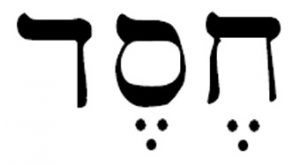 To Protestants, there is no more wonderful theological concept than “grace,” which we understand to mean undeserved forgiveness of sin. In older Bible versions, the word “grace” is often the translation of the Hebrew word hen in the Old Testament, which really means “favor” or “beauty.” According to David Bivin, this is actually an error on the part of translators.1
To Protestants, there is no more wonderful theological concept than “grace,” which we understand to mean undeserved forgiveness of sin. In older Bible versions, the word “grace” is often the translation of the Hebrew word hen in the Old Testament, which really means “favor” or “beauty.” According to David Bivin, this is actually an error on the part of translators.1
The Hebrew word that really comes much closer to our theological concept of “grace” is the word hesed (HEH-sed). It is a very rich and active word that is much deeper than just “mercy” or “lovingkindness,” as it is usually translated, and maybe even “grace” as we understand it. Hesed is to love as God loves. Based in a covenantal relationship, hesed is sometimes translated “unfailing love,” which endures to eternity:
Though the mountains be shaken and the hills be removed, yet my unfailing love (hesed) for you will not be shaken. Isa 54:10a
Hesed isn’t just cheap forgiveness of sin or a disregard for God’s laws. It is the gracious forgiveness that comes from love that is so enduring that it persists beyond any sin, always seeking to forgive:
For men are not cast off by the Lord forever. Though he brings grief, he will show compassion, so great is his unfailing love (hesed). Lam. 3:31-32
The word hesed has another aspect that also goes beyond “grace” as unmerited forgiveness of sin. Hesed also describes unmerited kindness that seeks to actively intervene to help a loved one. It is love in action, not just in our heads. Without a word for this, translators needed to invent the word “loving-kindness” or sometimes just “kindness.” An example is when the Lord helped Abraham’s find a wife for Isaac and he blessed God, “who has not abandoned his kindness (hesed) and faithfulness to my master” (Gen 24:27).
Together, both of these meanings of hesed describe the enduring nature of God’s love, and reflect the fact that God doesn’t just show his mercy by forgiving our sins, but in actively intervening in all of our lives. It is the merciful, faithful love that God extends to us, and what he wants us to extend to each other.
1See the article “Grace Compared” at www.jerusalemperspective.com.
~~~~
See Listening to the Language of the Bible, by Lois Tverberg and Bruce Okkema, En-Gedi Resource Center, 2004. This is a collection of devotional essays that mediate on the meaning of biblical words and phrases in their original setting.
For a friendly, bite-sized Bible study of five flavorful Hebrew words, see 5 Hebrew Words that Every Christian Should Know, by Lois Tverberg, OurRabbiJesus.com, 2014 (ebook).
M’agal – Righteous Paths
by Lois Tverberg
I have directed you in the way of wisdom; I have led you in upright paths.
When you walk, your steps will not be impeded; and if you run, you will not stumble. (Proverbs 4:11-12)
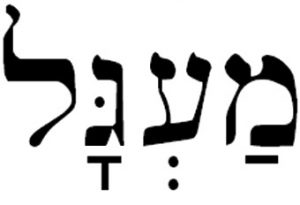 The Hebrew of the Bible usually uses physical pictures to express abstract truths, and many of these have surprisingly deep meanings for us. One common picture is the idea of the “path” or “way” to represent a person’s lifestyle — the direction of a person’s life, whether it follows God or wanders off.
The Hebrew of the Bible usually uses physical pictures to express abstract truths, and many of these have surprisingly deep meanings for us. One common picture is the idea of the “path” or “way” to represent a person’s lifestyle — the direction of a person’s life, whether it follows God or wanders off.
My picture of this “path” was the idea of traveling on a highway that God plotted out and constructed. I think of roads as institutional structures planned out to go to certain places, and constructed by governments of countries using earth-moving equipment and pavement for permanence. Of course God would build good roads and give me a map, the Bible to find my way.
It was a surprise, then, to find out that the common picture of a path is not a modern road. The word m’agal comes from the word for cart agalah and it refers to the rut carved into the ground from a heavy wagon, or a person’s footprints. It is the track left behind on a journey that reflects the kind of person who was there and where they chose to go.
When we speak of walking in God’s path, we are talking not just about traveling impersonal roads. Rather, God is calling us to put our feet in God’s own footprints, and travel on a journey that he himself has lovingly walked before us. When we know that in Christ, God came to walk with us as his people, we can then understanding that his reason was to walk before us in the way we ought to live.
~~~~
See Listening to the Language of the Bible, by Lois Tverberg and Bruce Okkema, En-Gedi Resource Center, 2004. This is a collection of devotional essays that mediate on the meaning of biblical words and phrases in their original setting.
For a friendly, bite-sized Bible study of five flavorful Hebrew words, see 5 Hebrew Words that Every Christian Should Know, by Lois Tverberg, OurRabbiJesus.com, 2014 (ebook).
Tal – The Dew of Unity
by Lois Tverberg
Behold, how good and how pleasant it is for brothers to dwell together in unity! It is like the precious oil upon the head, coming down upon the beard, even Aaron’s beard, coming down upon the edge of his robes. It is like the dew of Hermon coming down upon the mountains of Zion; – Psalm 133:1-3
 In the dry land of Israel, rain doesn’t fall for six months between May and October. Between that time dew, tal, is just as essential as rain, coming nightly in the summer as the fruit is growing. Without it, the fruit will shrivel and not mature.
In the dry land of Israel, rain doesn’t fall for six months between May and October. Between that time dew, tal, is just as essential as rain, coming nightly in the summer as the fruit is growing. Without it, the fruit will shrivel and not mature.
Because water was so important to the livelihood of the country, abundant rains were understood to be a sign of prosperity and blessing, like a good paying job with nice benefits would be today. But just like our lives, people could plan that part of the year would be bountiful with rain, and part of the year would be parched and dry. In the same way, we can count on some times of blessing and some times of want in our lives.
With those things in mind, Psalm 133:1-3 has been very meaningful to me. This verse speaks about the dew of Mt. Hermon falling on the mountains of Jerusalem. Mt. Hermon, in the north, receives enormous amounts of dew from the Mediterranean during much of the year — plants are drenched every night. Jerusalem is in the south and receives much less. But in a year that it receives a lot of dew, the fruit grows extremely well — it’s like a super-powered fertilizer has been poured on the land.
I find it fascinating that this image of abundant dew producing a bumper-crop of fruit is used to describe the effect of unity. In our individualistic culture, we tend to emphasize individual acheivement rather than learning to submit ourselves and work along side of others to acheive a greater goal. It seems that the only time we tend to do that is when we are under pressure because of lack of resources, like when the summer is very dry. But it is during this time that fruit is maturing, and when we learn to mutually submit and come together in true unity, that is when God is most able to produce an amazing bumper crop.
~~~~
See Listening to the Language of the Bible, by Lois Tverberg and Bruce Okkema, En-Gedi Resource Center, 2004. This is a collection of devotional essays that mediate on the meaning of biblical words and phrases in their original setting.
For a friendly, bite-sized Bible study of five flavorful Hebrew words, see 5 Hebrew Words that Every Christian Should Know, by Lois Tverberg, OurRabbiJesus.com, 2014 (ebook).
Echad – Loving God Alone
by Lois Tverberg
Noticing that Jesus had given them a good answer, [one of the teachers] asked him, “Of all the commandments, which is the most important?” “The most important one,” answered Jesus, “is this: `Hear, O Israel, the Lord our God, the Lord is one. Love the Lord your God with all your heart and with all your soul and with all your mind and with all your strength.'” – Mark 12:28-30
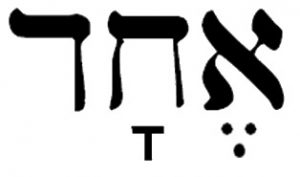 Jesus’ words that the most important commandment is to “love the Lord your God with all of your heart” are very familiar to us. Many readers also know that Jesus was quoting Deuteronomy 6:4-5 when he said this. By starting with the words “Hear O Israel…” he was beginning to say the Shema, a prayer of daily commitment to God that Jews have said since Jesus’ time up until today. One thing that that may strike us as odd is that the first line reads, “Hear, O Israel, the Lord our God, the Lord is one,” in many translations. Why is that so important to declare that God is one?
Jesus’ words that the most important commandment is to “love the Lord your God with all of your heart” are very familiar to us. Many readers also know that Jesus was quoting Deuteronomy 6:4-5 when he said this. By starting with the words “Hear O Israel…” he was beginning to say the Shema, a prayer of daily commitment to God that Jews have said since Jesus’ time up until today. One thing that that may strike us as odd is that the first line reads, “Hear, O Israel, the Lord our God, the Lord is one,” in many translations. Why is that so important to declare that God is one?
In Hebrew, the word is echad, which can mean one. It can also mean together, alone, only or unified. Jews have used the fact that it means “one” to see it as a reason that they cannot believe in a trinity or the deity of Christ. Christian evangelists say in response that echad can mean a compound unity, as when Adam and Eve together were echad (Gen. 2:24). This discussion of the word echad hinges on the idea that “the Lord is one” is a creedal statement about monotheism, and what kind of being God is.
Interestingly, the most authoritative Jewish text, the Tanakh by the Jewish Publication Society, says that the best reading of this phrase in this case really is not “one” but “alone.” So instead of reading this sentence as, “The Lord our God, the Lord is one,” it is more accurate to read it as “The Lord is our God, the Lord alone.” This changes the whole sentence so that instead of being a statement of monotheism, it is actually a command for a person’s absolute allegiance to God. God alone is the one we should worship, him only shall we serve. This also fits better into the rest of the passage, which tells us to love God whole-heartedly and to obey his commands.
Western Christians are very used to reciting statements of belief, so we might misunderstand this as saying that Jesus saw it as extremely critical that we believe in God’s “one-ness.” But when properly understood, it shows that the greatest commandment is not just the mental belief in monotheism, but is actually a call to entirely commit ourselves to the true God, him and him alone.
~~~~
See Listening to the Language of the Bible, by Lois Tverberg and Bruce Okkema, En-Gedi Resource Center, 2004. This is a collection of devotional essays that mediate on the meaning of biblical words and phrases in their original setting.
For a friendly, bite-sized Bible study of five flavorful Hebrew words, see 5 Hebrew Words that Every Christian Should Know, by Lois Tverberg, OurRabbiJesus.com, 2014 (ebook).
Nasag – Overtaken by God
Now it shall be, if you diligently obey the LORD your God, being careful to do all His commandments which I command you today, the LORD your God will set you high above all the nations of the earth. All these blessings will come upon you and overtake you if you obey the LORD your God. (Deuteronomy 28:1-2)
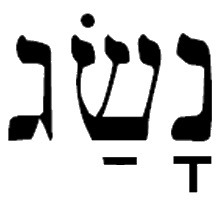 Several Hebrew words come out of the practice of hunting. One was radaf, to “chase after” or “pursue”; another was nasag, meaning “to overtake” or “to catch up to.” Of course these words were used in their literal sense, as when Laban pursued (radaf) and overtook (nasag) Jacob fleeing with his daughters (Genesis 31:23).
Several Hebrew words come out of the practice of hunting. One was radaf, to “chase after” or “pursue”; another was nasag, meaning “to overtake” or “to catch up to.” Of course these words were used in their literal sense, as when Laban pursued (radaf) and overtook (nasag) Jacob fleeing with his daughters (Genesis 31:23).
In our fast-paced culture, most of us seem to be chasing after something. Even Christians feel like they need to be pursuing more and more. When we describe how we are doing spiritually, we say that we’re “in pursuit” of a deeper walk with God or a greater ability to serve. We’re always striving.
But listen to the delightful imagery in Deuteronomy 28:1-2. When Israel seeks after doing God’s will, what happens is not that they will “catch up to” God or his blessings. Instead, God’s blessings will catch up to them! The text says, “All these blessings will come upon you and overtake (nasag) you if you obey the LORD your God.”
The imagery is hilarious here, as if God is running after people with armloads of gifts. What a thought. If we pursue righteousness, we don’t have to worry about finding our reward, because God is chasing after us with it!
Another lovely place where we find imagery like this is Psalm 23:6
“Surely goodness and mercy will pursue (radaf) me all of my life….”
Most translations say that “goodness and mercy will follow me,” but the word here is radaf, which means “pursue”! The psalmist has no worries about his enemies who are after him, because he is utterly convinced that God is chasing him down with his love.
.

(Photo: Lee Lilly)
~~~~
See Listening to the Language of the Bible, by Lois Tverberg and Bruce Okkema, En-Gedi Resource Center, 2004. This is a collection of devotional essays that mediate on the meaning of biblical words and phrases in their original setting.
For a friendly, bite-sized Bible study of five flavorful Hebrew words, see 5 Hebrew Words that Every Christian Should Know, by Lois Tverberg, OurRabbiJesus.com, 2014 (ebook).
Ahf – When Anger Burns
by Lois Tverberg
So Moses took the rod from before the LORD, just as He had commanded him; and Moses and Aaron gathered the assembly before the rock. And he said to them, “Listen now, you rebels; shall we bring forth water for you out of this rock?” Then Moses lifted up his hand and struck the rock twice with his rod; and water came forth abundantly, and the congregation and their beasts drank. But the LORD said to Moses and Aaron, “Because you have not believed Me, to treat Me as holy in the sight of the sons of Israel, therefore you shall not bring this assembly into the land which I have given them.” – Numbers 20:9-12 (NAS)
 Hebrew has a very interesting word for anger, which is ahf. It is also the word for “nose” or “nostril,” and when someone is very angry, his anger is said to “burn,” harah (ha-RAH). It’s a picture of a person so furious that his face is flushed and his nostrils get hot.
Hebrew has a very interesting word for anger, which is ahf. It is also the word for “nose” or “nostril,” and when someone is very angry, his anger is said to “burn,” harah (ha-RAH). It’s a picture of a person so furious that his face is flushed and his nostrils get hot.
In the Scriptures there is an interesting lesson we can learn about anger. Jewish commentaries discuss why God decided after Moses struck the rock not to allow Moses to enter the Promised Land. They suggest that perhaps the reason was not the simple fact that Moses disobeyed God by hitting the rock instead of speaking to it. Rather, could it be that instead of speaking calmly and honoring God by showing that he would provide water, Moses let his rage at the people so overwhelm him that he forgot to honor God and struck the rock out of fury? The commentators imaginatively suggest that after many long years with this obstinate people, Moses had finally reached his limit, and his anger simply overwhelmed him. At that point God decided that another leader must be raised up to complete the mission of entering the land.
Interestingly, this happened in the life of Elijah as well. He struggled for years against the apostasy of Israel in Baal worship. Even after he had won the great victory on Mt. Hermon, he fled for his life, exhausted, and ran all the way down to Mt. Horeb (Sinai). There he poured out his anger against the people, saying,
I have been very zealous for the LORD, the God of hosts; for the sons of Israel have forsaken Your covenant, torn down Your altars and killed Your prophets with the sword. And I alone am left; and they seek my life, to take it away.
With him too, anger had taken its toll, leaving him profoundly discouraged. God told him to find Elisha and train him up to take his place. Even though Elijah had every reason for anger, when it was too much, God saw that someone else would need to take over for him.
These two stories show us how even the wisest can get worn down by frustrations over the years. One rabbinic comment is that, “When a wise man lets his anger overcome him, he loses all his wisdom.” We need to seek relief from our anger before it costs us our ability to lead. Certainly this is all the more true in marriage — uncontrolled anger and contempt is often what brings them to an end.
~~~~
See Listening to the Language of the Bible, by Lois Tverberg and Bruce Okkema, En-Gedi Resource Center, 2004. This is a collection of devotional essays that mediate on the meaning of biblical words and phrases in their original setting.
For a friendly, bite-sized Bible study of five flavorful Hebrew words, see 5 Hebrew Words that Every Christian Should Know, by Lois Tverberg, OurRabbiJesus.com, 2014 (ebook).
Inclined Toward God
by Lois Tverberg
Count yourself dead to sin but alive to God in Christ Jesus. Therefore do not let sin reign in your mortal body so that you obey its evil desires. Do not offer the parts of your body to sin, as instruments of wickedness, but rather offer yourselves to God, as those who have been brought from death to life. (Romans 6:11-13)
In Jewish thought, there has been a tradition that humans are ruled by two inclinations — the yetzer hara (YET-ser ha-RAH – evil inclination) and the yetzer hatov (YET-ser ha-TOVE – good inclination). Another way this was said was that man either obeyed his yetzer (inclination – his own will) or his yotzer (Creator – God).
One rabbi said,
Man, while he lives, is the slave of two masters: the slave of his Creator and the slave of his inclination. When he does the will of his Creator, he angers his inclination, and when he does the will of his inclination, he angers his Creator. When he dies, he is freed, a slave free from his master.1
This last statement means that in death humans are freed from serving their sinful inclinations, so that in the next life, they will be servants only of God.
This is fascinating because it seems to be the background of Paul’s words to the Romans. He speaks about being slaves to sin in our former lives, but when we were baptized in Christ, we were united with him in his death. He understands that just as Jesus was resurrected and now was living his eternal life, so are we.
When we were baptized, God made us new creations and gave us eternal life, which began right then and will extend into the world to come. God has freed us from slavery to our yetzer hara so that we can serve only our yotzer, Creator, the Lord.
1Rabbi Shimeon ben Pazzai, from the 3rd century AD, as quoted by David Flusser in Judaism and the Origins of Christianity, Magnes Press 1988, pp. 169-170.
~~~~
See Listening to the Language of the Bible, by Lois Tverberg and Bruce Okkema, En-Gedi Resource Center, 2004. This is a collection of devotional essays that mediate on the meaning of biblical words and phrases in their original setting.
For a friendly, bite-sized Bible study of five flavorful Hebrew words, see 5 Hebrew Words that Every Christian Should Know, by Lois Tverberg, OurRabbiJesus.com, 2014 (ebook).
Tamim – Being Perfect
by Lois Tverberg
You have heard that it was said, `Love your neighbor and hate your enemy.’ But I tell you: Love your enemies and pray for those who persecute you, that you may be sons of your Father in heaven. He causes his sun to rise on the evil and the good, and sends rain on the righteous and the unrighteous. If you love those who love you, what reward will you get? Are not even the tax collectors doing that? And if you greet only your brothers, what are you doing more than others? Do not even pagans do that? Be perfect, therefore, as your heavenly Father is perfect. – Matthew 5:43-48
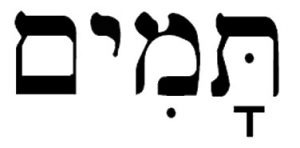 A lot of us struggle with the saying of Jesus’ that we should be perfect, as our heavenly Father is perfect. Knowing its context and a little about language can help us have a clearer understanding.
A lot of us struggle with the saying of Jesus’ that we should be perfect, as our heavenly Father is perfect. Knowing its context and a little about language can help us have a clearer understanding.
The word that most likely came out of Jesus’ mouth was tamim, which in Hebrew means “pure,” blameless,” “perfect,” “wholehearted,” or “complete.” The sacrificial lamb of Passover needed to be tamim — without imperfections, completely whole. God told the Israelites to be perfect (tamim) before him in Deut. 18:13, then meaning wholeheartedly committed to him.
So Jesus is saying that we need to be wholehearted, but about what? Often people quote this line by itself and then become overwhelmed by its demands of moral perfection. Most likely, however, Jesus was not giving an undoable command to be entirely sinless. More likely, this is meant to be read as the culminating line of Jesus’ teaching about love that begins at verse 43. Jesus was pointing out that while humans hate their enemies, God shows love to everyone by giving good gifts even to those who hate him. He sends rain and sun alike on everyone, regardless of merit.
Other later rabbis noted a simiar thing. Rain is indeed precious in the arid Middle East, and God had threatened in the past to withhold it because of Israel’s sins. Surprisingly, though, God caused rain showers to fall and nourish the land and he didn’t discriminate between who received it. This was a sign of God’s mercy, they said. They even commented:
Greater is the day of rain than the resurrection of the dead because the resurrection of the dead benefits only the righteous, but rain benefits both the righteous and the unrighteous.
 The “day of the resurrection” is the day when the dead will rise and be judged at the end of time. For the righteous it will be a day of great joy, of the coming of God’s glorious reign on earth. For the wicked, it will be a terrible day of judgment, however. Every day that God provides rain for all of us it shows the mercy of God towards sinners in this life. That’s the merciful, magnanimous love we are supposed to show to all if we want to be tamim, pure and complete.
The “day of the resurrection” is the day when the dead will rise and be judged at the end of time. For the righteous it will be a day of great joy, of the coming of God’s glorious reign on earth. For the wicked, it will be a terrible day of judgment, however. Every day that God provides rain for all of us it shows the mercy of God towards sinners in this life. That’s the merciful, magnanimous love we are supposed to show to all if we want to be tamim, pure and complete.
Even the worst sinners are capable of love, even if just for their friends, but it is incomplete. In contrast, God loves all humanity — his love is complete in that sense. While our love can never be equal in quantity to God’s, it can be like his in its quality of being extended to even those who don’t deserve it. In that sense we are called to imitate God’s perfect love for the world.
~~~~
Photo by Anne Nygård on Unsplash
See Listening to the Language of the Bible, by Lois Tverberg and Bruce Okkema, En-Gedi Resource Center, 2004. This is a collection of devotional essays that mediate on the meaning of biblical words and phrases in their original setting.
For a friendly, bite-sized Bible study of five flavorful Hebrew words, see 5 Hebrew Words that Every Christian Should Know, by Lois Tverberg, OurRabbiJesus.com, 2014 (ebook).
God’s Kind of Righteousness
by Lois Tverberg
Seek first his kingdom and his righteousness, and all these things will be added unto you. (Matthew 6:33)
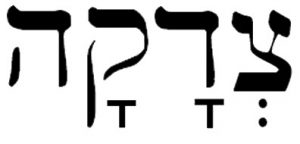 Our understanding of the word “righteousness” (tzedakah – tzeh-dah-KAH) doesn’t come near to understanding the wide, rich meanings of the idea in Hebrew, and sometimes confuses us when we read the Scripture. Our traditional understanding of this idea is correct performance of regulations and legal perfection. When we hear about the “righteousness of God” we cringe, thinking that out of righteousness, God is angry with us when we cannot measure up.
Our understanding of the word “righteousness” (tzedakah – tzeh-dah-KAH) doesn’t come near to understanding the wide, rich meanings of the idea in Hebrew, and sometimes confuses us when we read the Scripture. Our traditional understanding of this idea is correct performance of regulations and legal perfection. When we hear about the “righteousness of God” we cringe, thinking that out of righteousness, God is angry with us when we cannot measure up.
It may surprise us, then, that the phrase, tzedkot Adonai (righteous acts of God) in Jewish versions of the Bible is translated as “kindnesses,” “abundant benevolences,” “gracious acts,” and “gracious deliverances.” This is because the word tzedakah means more than just legal correctness: it refers to covenantal faithfulness, often resulting in rescuing those in distress and showing mercy to sinners.
This is why King David says to God, “Judge me, O LORD my God, according to Your righteousness, and do not let them rejoice over me” (Psa. 35:24). He is actually appealing to God’s mercy to those under his covenant, rather than his legal judgments.
This idea of tzedakah as mercy is even found in Jesus time. A common idiom in use by Jews from that time (and still used today) was to use the word tzedakah to refer to charity and almsgiving. Jesus uses it this way when he says not to do your “acts of righteousness” in front of others, and then he goes on to speak about giving to the poor (Mt 6:1-4).
We see now that the word tzedakah goes beyond “legal perfection.” But we might wonder why many people are spoken of as righteous in the Old Testament, even though they are hardly perfect. How can we be called righteous too? One commentary says that a better way to define the righteous, biblically, would be:
“…those who, in humility and faithfulness, trust in the Lord, despite persecution and oppression; those who seek to live uprightly and without pride of heart, depending on the Lord for protection and vindication. `Righteousness’ here is not ethical perfection, but that obedience and uprightness of the faithful who plead with God for a favorable decision, not always in order to be `justified’ against an adversary, but often, in an absolute manner, to be accepted and saved.”
~~~~
See Listening to the Language of the Bible, by Lois Tverberg and Bruce Okkema, En-Gedi Resource Center, 2004. This is a collection of devotional essays that mediate on the meaning of biblical words and phrases in their original setting.
For a friendly, bite-sized Bible study of five flavorful Hebrew words, see 5 Hebrew Words that Every Christian Should Know, by Lois Tverberg, OurRabbiJesus.com, 2014 (ebook).
Joy of Repentance
by Lois Tverberg
I tell you that in the same way, there will be more joy in heaven over one sinner who repents than over ninety-nine righteous persons who need no repentance. Luke 15:7
The Hebrew word that we commonly translate as repentance is teshuvah (teh-SHOO-vah). But knowing more about the word and the concept behind it can give us insight on the act of repentance. First, teshuvah literally means “to return,” as when a person does an about-face and walks in the opposite direction from where they were headed before, like when the prodigal son comes home. It also embodies the picture of a person rediscovering what had been left behind before—a new, whole relationship that replaces a broken one.
Interestingly, teshuvah doesn’t really refer to having inward remorse for sin, which is the initial response to a realization of wrongdoing. Rather, it points toward the later, outward result of repentance—that a person actually makes a decision to change and do things differently.
This is an important lesson for us to learn—that to regret something and still keep choosing to do it isn’t really repentance at all. God is ready to forgive us as soon as we call out to him, but if we want to experience healing, we need to make up our mind to live differently and then make a step in that direction—not just wallow in remorse. He has set us free, and we need to claim the freedom in his Spirit to change from our former selves and live as the new creation that we really are.
Another thing that is emphasized in the concept of teshuvah is the joy and love that is the final result. Once we realize our sin and ask for and claim forgiveness, we can know that we are completely acceptable in God’s sight and our time of mourning is over. The rabbis say that when we repent, God actually takes our rebellion and sin and turns it into a source of joy, because we love God more knowing that he has shown his love in spite of ourselves. As Jesus said, “Therefore I tell you, her sins, which were many, are forgiven, thus she loved much; but the one who is forgiven little loves little” Luke 7:47.
Photo by Joel Muniz and Jim Wilson on Unsplash
We’re pleased to be able to share this difficult-to-find classic by Brad Young. Check it out!
The Jewish Background to the Lord’s Prayer
by Brad H. Young
© 1984, Gospel Research Foundation Inc.
Softcover, 46 pages, $8.99
- Explore the Jewish roots of the Lord’s Prayer
- Learn how the Dead Sea Scrolls, rabbinic literature, Jewish prayers, and worship breathe fresh meaning into the revered words of the Lord’s Prayer
- Understand Jesus’ powerful prayer better in the light of Jewish faith and practice
Dr. Brad H. Young (PhD Hebrew University, under David Flusser) is the founder and president of the Gospel Research Foundation in Tulsa, Oklahoma. He is emeritus professor of Biblical Literature in Judaic-Christian Studies in the Graduate School of Theology at Oral Roberts University. Young has taught advanced language and translation courses as well as the Jewish foundations of early Christianity to graduate students for over thirty years.
Check out what else is available from the En-Gedi Resource Center bookstore too…





